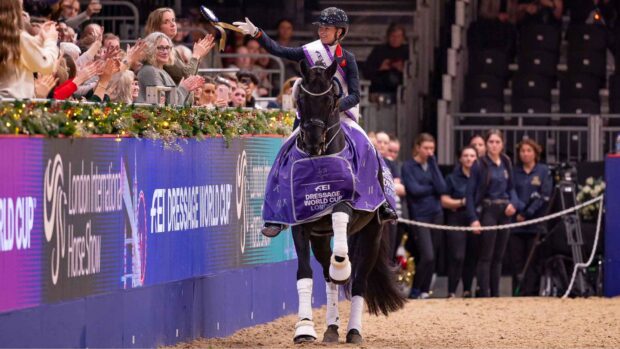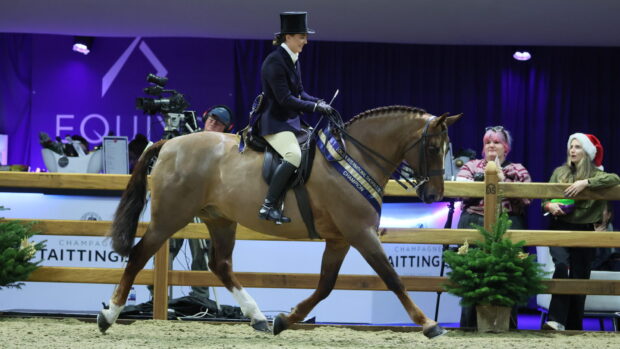Horse simulators could help boost participation and break down barriers in the industry – and benefit riders with disabilities.
Aberdeen Riding Club (ARC) held a launch event for its new simulator, “Murphy”, last month. It was bought by the Seven Incorporated Trades of Aberdeen and a private donor to be a “community asset”. It is available to individuals and groups, including the Riding for the Disabled Association (RDA), private coaches, physios and hippotherapists, who provide physio treatment for people, involving horses.
ARC executive director and club manager Ms McCarthy, also British Horse Society (BHS) chair, discussed barriers to equestrianism, including riding school closures, an industry skills shortage, accessibility and diversity and the costs involved.
“The simulator will touch these groups in different ways. Murphy can work 24/7 and has lower running costs than a horse; he doesn’t need to be shod, fed or have the vet. We can make sessions considerably cheaper than a lesson on a horse,” she said, adding that the simulator will help address ARC’s 500-rider waiting list.
“New riders can be assessed on him and get straight into a group lesson rather than waiting for a private lesson.”
It is hoped Murphy will appeal to riders from the BHS Changing Lives through Horses programme, which helps disengaged young people, and boys.
“There’s a lack of boys in grassroots participation and the only way we’re going to engage more is to make it more fun for them – so why not encourage that with the simulator?” Ms McCarthy said, adding that Murphy can engage “more people who haven’t thought about equestrianism”.
“He’s totally different and a bit like a game or computer. If they like Murphy, chances are they might think about the real thing further down the line.”
Ms McCarthy discussed other highlights of the simulator – including assessment of all new riders regardless of ability, promoting horse welfare. Murphy is accessible to wheelchair users, and the use of a simulator allows RDA and hippotherapy coaches to be more hands-on. Simulator sessions can help riders with balance issues or those returning after confidence issues or injury, or used for ridden physio clinics.
Ms McCarthy said data will be used by the BHS to assess whether the simulator could be a “good business model” for other centres.
Valerie Cooper, who leads the ARC hippotherapy group and is the regional physiotherapist for Grampian and Highland RDA, explained how the simulator will benefit riders and those who are unable to ride.
“We take children who are unable to attend the everyday RDA groups – because they might need a physiotherapist to improve their balance, coordination and symmetry – to then move on to take up riding skills. They can then have riding as a hobby, one that will maintain their fitness and wellbeing,” Ms Cooper said.
“Some of our riders will never be able to stand or walk and as those riders get bigger, we sometimes have the issue of trying to get them on a horse – or once they’re on, ensuring they’re going to be safe. Unfortunately for some of our riders, it becomes too unsafe to have them on a real horse, so the simulator means they don’t have to stop riding or improving in their core strength, balance, and coordination.”
ARC is taking part in the BHS Everyone Welcome initiative, for which 15 centres will run a pilot to address a barrier to the industry. ARC is targeting 13 to 16-year-olds from low socio-economic backgrounds, and Murphy will help.
“It needs to be sustainable – we’re not going to take 40 people in, they get one shot on a horse and off they go again. For it to be successful, this needs to be run over a year so at the end, we can see how many want to keep participating or, thinking of the skills shortage, if any want to go into the industry,” Ms McCarthy said.
BHS chief executive James Hick told H&H the initiative builds further on the society’s Changing Lives through Horses programme, to “make sure everyone feels welcome to become a part of the equestrian community – whatever their ability, background, culture, or identity”.
“To make sure that we test and learn appropriately, we’re starting off with a small number of centres to get as much input and feedback as possible, before we roll it out further. It’ll cover every aspect of our world, including targets for employment and volunteering, participation, and membership, to name just a few and will be supported by BHS grants initially,” he said.
- To stay up to date with all the breaking news throughout major shows such as London International and more, subscribe to the Horse & Hound website
You may also be interested in:

Why horses’ relevance to the public is key to our sport’s survival

‘Horses for all’: new strategy aims to encourage more people to engage with equines

Why a mechanical horse could transform your riding
Whether you’re a complete beginner or an experienced rider, we find out how a mechanical horse could boost your performance

Subscribe to Horse & Hound magazine today – and enjoy unlimited website access all year round




